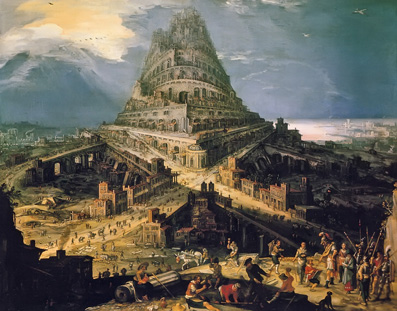
Tower of Babel artwork in Pinacoteca Nazionale in Bologna, c. 1500
The beginning of a year that is yet again an apocalyptic venue is as good a time as any to quote from the biblical book of Genesis. Many of the events in Genesis took place in the legendary space that we now call Iraq, a space that the United States military is unoccupying after a prolonged mission that appears to have accomplished more mayhem than a lasting peace (at least in the recent holiday “peace on earth” spirit). Remember the story of the Tower of Babel; well here is my take of a new translation, being as faithful as I dare to the original King James English:
Genesis 11: The Tower of Babel
1 And the whole earth outside the Axis of Evil was of one mind, and of one resolve about the WMD of King Saddam.
2 And it came to pass, as the coalition troops journeyed to the east, that they found a plain in the land of Shinar, but no WMD; and they dwelt there for almost a decade.
3 And they said one to another, Go to, let us make bombs, and burn them thoroughly. And they had billions of dollars in weapons for battle, and slime had they in mind for talking about the party of the king.
4 And they said, Go to, let us build us a democracy, and a puppet regime, who will sell us oil that reaches unto the ports of Texas; and let us make us a name to be feared, lest we not have economic hegemony upon the face of the whole earth.
5 And the ones who lorded over came down to see the democracy and the puppet regime, which the children of the founding fathers builded.
6 And the ones who lorded over said, Behold, the people is one, and they have all one dangerous religion; and this they begin to do: and now nothing will be restrained from them, which they have imagined in their sharia to do.
7 Go to, let us go down, and there stoke their differences, that they may attack each other because of one another’s sectarian speech.
8 So the ones who lorded over scattered them with superior air power from thence upon the face of all the earth: and they left off to build the democracy.
9 Therefore is the name of it called Babel; because the ones who lorded over did there confound themselves, not knowing what they needed to know about Islam, Iraqi culture or the Arabic language.
A problem in the translation, you say? Well, yes, the issue of translation has been a problem for the U.S. involvement in Iraq. By this, I mean a moral problem, not one of biblical exegesis. Consider the following statement, which needs no translation as the moral quandary is transparent:
At least 1,000 Iraqis who worked as interpreters for the U.S. have been assassinated over the years. Many were tortured first and some were beheaded. Whole families have been murdered because one member of the family made a decision to work alongside U.S. troops and try to make Iraq a better place. Those of us who survive are labeled traitors and subjected to threats. Influential Shiite leaders like Moqtada al-Sadr have singled us out in aggressive speeches. Militia leaders are said to have lists of “collaborators.†And yet, the United States has opened its doors to only a fraction of the people it relied on in Iraq. Applications languish for years.
The author of the statement is an Iraqi woman who served as a translator for the U.S. in Iraq and has to use a pseudonym (Sarah Mustafa) for fear of reprisal. Her husband was killed in 2008, because of her work with the U.S. She now fears for her children. Yet, she has not been given asylum from a regime that the U.S. has pledged to equip with 11 billion dollars worth of new arms.
One universal translation is needed in all languages and dialects, not of the Gospel of John, but one a simple phrase voiced (though I doubt for the first time) by the American Civil War general William Tecumseh Sherman: “War is Hell.” I’ll start the chain: الØرب جهنم (Al-harb jahanam). Feel free to add your own translations to this post.